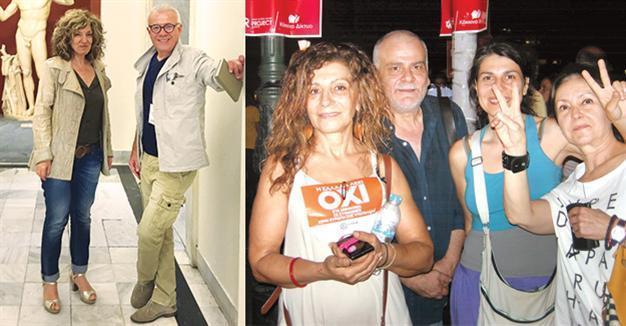Greece’s Syriza hopes for ‘strong no’ in referendum
ATHENS

Daily Hürriyet columnist Ertuğrul Özkök, SYRIZA deputy Sia Anagnostopoulou (L) and daily Hürriyet's Athens correspondent Yorgo Kırbaki are seen with Greeks who declared they would vote "No" in Sunday's referendum.
Hours before Greece became the first developed country to default on a loan to the International Monetary Fund (IMF), a Syriza deputy told daily Hürriyet the ruling party hoped Greeks would vote a “strong no” in the country’s crucial referendum on July 5.Daily Hürriyet columnist Ertuğrul Özkök and Athens correspondent Yorgo Kırbaki tested the pulse of the Greek street on June 30, when both the “Ναι” (Yes) and “Οχι” (No) camps organized rallies ahead of the vote.
The IMF announced early July 1 that Greece had missed a $1.8 billion debt payment, as Eurozone finance chiefs refused to grant a last-minute extension of the bailout program Athens has relied on for five years.
The “Οχι” supporters who attended rallies in Athens support Prime Minister Alexis Tsipras’ decision to hold a referendum on July 5, in which Greek voters can decide whether to approve a deal proposed by the country’s creditors. “I was born as rich, but I will probably die poorer. However, we will not be a country that is humiliated and despised by Europe,” one of them told Hürriyet.
Those who advocated for a “Ναι” vote, on the other hand, see austerity measures as a bitter pill to swallow to overcome the crisis. “The proudest stance is walking with a head held high by paying your debts,” one pensioner told daily Hürriyet, voicing doubt about the ruling Syriza’s discourse.
Anagnostopoulou: ‘EU can kick us out’
“European capitalism has betrayed the ideal of social state and launched a counter revolution. It needs to be fixed,” Syriza deputy Sia Anagnostopoulou told daily Hürriyet in an interview on June 30. “We came to power by promising people that we will oppose austerity measures. We will hold this promise.”
Anagnostopoulou, a former history professor whose academic background also includes Turkology, insisted that Syriza was not “bluffing.”
“We definitely want to see a ‘No’ as the outcome of the July 5 referendum. And we want it to be a very strong no,” she said.
When asked whether a “No” in the referendum means Greece would leave the Eurozone, Anagnostopoulou was more cautious. “We declared that we would remain in the EU and Eurozone. But if they want, they can kick us out,” she said.
“You should have understood from the blue jeans I am wearing now that I am not a person accustomed to political power,” she said, when asked if Greeks decide to say “Yes,” recalling Tsipras’ vow to go to the polls if Greeks approve austerity measures.
















